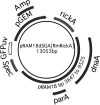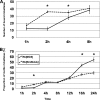Motility characteristics are altered for Rickettsia bellii transformed to overexpress a heterologous rickA gene
- PMID: 24296498
- PMCID: PMC3911190
- DOI: 10.1128/AEM.03352-13
Motility characteristics are altered for Rickettsia bellii transformed to overexpress a heterologous rickA gene
Abstract
The rickettsial protein RickA activates host cell factors associated with the eukaryotic actin cytoskeleton and is likely involved with rickettsial host cell binding and infection and the actin-based motility of spotted fever group rickettsiae. The rickA gene sequence and protein vary substantially between Rickettsia species, as do observed motility-associated phenotypes. To help elucidate the function of RickA and determine the effects of species-specific RickA variations, we compared extracellular binding, intracellular motility, and intercellular spread phenotypes of three Rickettsia bellii variants. These included two shuttle vector-transformed R. bellii strains and the wild-type isolate from which they were derived, R. bellii RML 369C. Both plasmid shuttle vectors carried spectinomycin resistance and a GFPuv reporter; one contained Rickettsia monacensis-derived rickA, and the other lacked the rickA gene. Rickettsia bellii transformed to express R. monacensis rickA highly overexpressed this transcript in comparison to its native rickA. These rickettsiae also moved at higher velocities and followed a more curved path than the negative-control transformants. A lower proportion of R. monacensis rickA-expressing bacteria ever became motile, however, and they formed smaller plaques.
Figures






Similar articles
-
Examination of Rickettsial Host Range for Shuttle Vectors Based on dnaA and parA Genes from the pRM Plasmid of Rickettsia monacensis.Appl Environ Microbiol. 2022 Apr 12;88(7):e0021022. doi: 10.1128/aem.00210-22. Epub 2022 Mar 24. Appl Environ Microbiol. 2022. PMID: 35323021 Free PMC article.
-
The Rickettsia actin-based motility effectors RickA and Sca2 contribute differently to cell-to-cell spread and pathogenicity.mBio. 2025 Feb 5;16(2):e0256324. doi: 10.1128/mbio.02563-24. Epub 2025 Jan 17. mBio. 2025. PMID: 39819005 Free PMC article.
-
Role of Sca2 and RickA in the Dissemination of Rickettsia parkeri in Amblyomma maculatum.Infect Immun. 2018 May 22;86(6):e00123-18. doi: 10.1128/IAI.00123-18. Print 2018 Jun. Infect Immun. 2018. PMID: 29581194 Free PMC article.
-
Progress in rickettsial genome analysis from pioneering of Rickettsia prowazekii to the recent Rickettsia typhi.Ann N Y Acad Sci. 2005 Dec;1063:13-25. doi: 10.1196/annals.1355.003. Ann N Y Acad Sci. 2005. PMID: 16481486 Review.
-
Plasmids and rickettsial evolution: insight from Rickettsia felis.PLoS One. 2007 Mar 7;2(3):e266. doi: 10.1371/journal.pone.0000266. PLoS One. 2007. PMID: 17342200 Free PMC article. Review.
Cited by
-
The bacterial microbiome of Dermacentor andersoni ticks influences pathogen susceptibility.ISME J. 2016 Aug;10(8):1846-55. doi: 10.1038/ismej.2015.266. Epub 2016 Feb 16. ISME J. 2016. PMID: 26882265 Free PMC article.
-
Engineering of obligate intracellular bacteria: progress, challenges and paradigms.Nat Rev Microbiol. 2017 Sep;15(9):544-558. doi: 10.1038/nrmicro.2017.59. Epub 2017 Jun 19. Nat Rev Microbiol. 2017. PMID: 28626230 Free PMC article. Review.
-
An O-Methyltransferase Is Required for Infection of Tick Cells by Anaplasma phagocytophilum.PLoS Pathog. 2015 Nov 6;11(11):e1005248. doi: 10.1371/journal.ppat.1005248. eCollection 2015. PLoS Pathog. 2015. PMID: 26544981 Free PMC article.
-
Cytoarchitecture of ex vivo midgut cultures of unfed Ixodes scapularis infected with a tick-borne flavivirus.Ticks Tick Borne Dis. 2024 Mar;15(2):102301. doi: 10.1016/j.ttbdis.2023.102301. Epub 2023 Dec 21. Ticks Tick Borne Dis. 2024. PMID: 38134511 Free PMC article.
-
Isolation and Propagation of Laboratory Strains and a Novel Flea-Derived Field Strain of Wolbachia in Tick Cell Lines.Microorganisms. 2020 Jul 1;8(7):988. doi: 10.3390/microorganisms8070988. Microorganisms. 2020. PMID: 32630209 Free PMC article.
References
-
- Gouin E, Welch MD, Cossart P. 2005. Actin-based motility of intracellular pathogens. Curr. Opin. Microbiol. 8:35–45 http://dx.doi.org/10.1016/j.mib.2004.12.013 - DOI - PubMed
Publication types
MeSH terms
Substances
Grants and funding
LinkOut - more resources
Full Text Sources
Other Literature Sources

